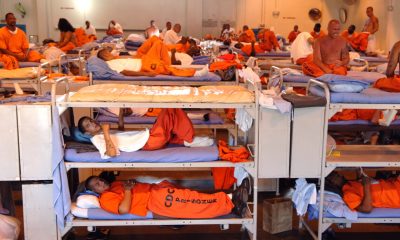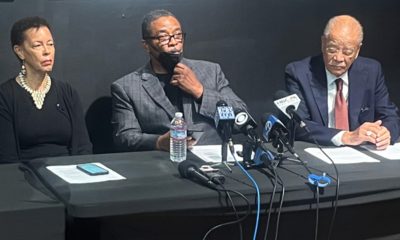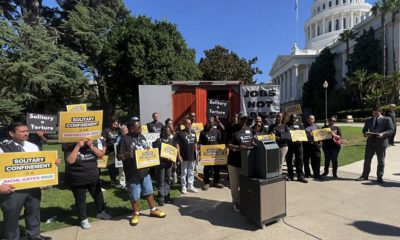Crime
Historic Settlement Ends CA Indefinite Solitary Confinement
Federal Judge Claudia Wilken this week approved the final agreement to end indefinite solitary confinement in California calling the settlement humane, innovative and fair.
Prisoners celebrated Tuesday’s settlement agreement, whose terms were agreed on last September, claiming it as a victory that bolstered their struggle for human rights.
<p>
Oakland civil rights attorney Anne Weills, one of the attorneys representing the prisoners, said, “What was missing from the courtroom were all the prisoners who risked their lives in the hunger strikes of 2011 and 2013.”
“Yes, our litigation team did the best we could to bring our clients out of indefinite solitary confinement and into the light of day – but there is no doubt that we could not have gotten where we have with this settlement without the leadership of the brilliant, courageous, fearless and enlightened men in the Short Corridor at Pelican Bay who in 2011 set this all in motion,” she said.
The Center for Constitutional Rights released data showing the agreement has already led to the transfer of hundreds of prisoners from segregated housing units back to the state’s general prison population.
Between preliminary approval of the California settlement in October and Jan. 22, 686 out of a total of 1,813 prisoners entitled to reviews under the settlement have been reviewed for release into the general prisoner population; 546 of the prisoners reviewed, nearly 80 percent, have been cleared for release into general population; and 437 have actually been released from solitary confinement.
The vast majority of prisoners who have been reviewed but not cleared are awaiting a higher-level prison review; most are expected to be released into general population as well.
The settlement requires all first-level reviews to be complete within one year.
Jules Lobel, the attorney representing the Center for Constitutional Rights said “we look forward to the full implementation of all its terms.”
One of the longtime prisoner organizers, Mutope Duguma, cautions, “The power of the legal support and the family/community support is what literally humanized us prisoners to the rest of the world. The countless families and friends did a remarkable job in representing us from an emotional and human perspective and our legal support represented our civil and human rights, and together they re-humanized us as men and women.”
“This is what made it possible for us to be able to demand such a settlement. It is with this family, community, and legal support that we demand accountable implementation of the settlement. We know what works so let’s stay the course,” he said.
A recently released letter written by one of the main representatives of the prisoners asks that prisoners “Monitor and report on the functional implementation of prison conditions and California Department of Corrections and Rehabilitation (CDCR) employees, holding their feet to the ground and letting CDCR employees know that they are not above the Ashker v. Brown Settlement Agreement.”
The settlement transforms California’s use of solitary confinement from a status-based system, in which prisoners were isolated indefinitely based on vague and unsubstantiated allegations of gang affiliation, to a behavior-based system, in which solitary confinement is used only as punishment for serious rule infractions and only for determinate periods of time. It also limits the total amount of time a prisoner can spend in the Security Housing Unit (SHU) at Pelican Bay State Prison.
The settlement includes a two-year monitoring period, which may be extended if the CDCR is found to be violating prisoners’ constitutional rights or the settlement terms.
When the case was filed in 2012 on behalf of prisoners in Pelican Bay, more than 500 of them had been isolated in the SHU for over 10 years, and 78 had been there for more than 20 years. They spent 22-and-a-half to 24-hours every day in a cramped, concrete, windowless cell, and were denied telephone calls, physical contact with visitors, and vocational, recreational, and educational programming.
Hundreds of other prisoners throughout California have been held in similar SHU conditions, and the settlement applies to all of them.
Alameda County
DA Pamela Price Stands by Mom Who Lost Son to Gun Violence in Oakland
Last week, The Post published a photo showing Alameda County District Attorney Pamela Price with Carol Jones, whose son, Patrick DeMarco Scott, was gunned down by an unknown assailant in 2018.

Publisher’s note: Last week, The Post published a photo showing Alameda County District Attorney Pamela Price with Carol Jones, whose son, Patrick DeMarco Scott, was gunned down by an unknown assailant in 2018. The photo was too small for readers to see where the women were and what they were doing. Here we show Price and Jones as they complete a walk in memory of Scott. For more information and to contribute, please contact Carol Jones at 510-978-5517 at morefoundation.help@gmail.com. Courtesy photo.
California Black Media
Anti-Theft Bill with Jail-Time Requirement Gets Wide Ranging Support
Fed up with the alarming frequency of retail theft across California, including smash and grabs, a diverse group of business leaders, law enforcement officials, policymakers and public safety advocates joined their efforts in Sacramento on Jan. 24. Their purpose: to increase public support for Assembly Bill (AB) 1772, a bill that would make jail time mandatory for repeat theft offenders.

By California Black Media
Fed up with the alarming frequency of retail theft across California, including smash and grabs, a diverse group of business leaders, law enforcement officials, policymakers and public safety advocates joined their efforts in Sacramento on Jan. 24.
Their purpose: to increase public support for Assembly Bill (AB) 1772, a bill that would make jail time mandatory for repeat theft offenders.
Co-authored by Assemblymembers James C. Ramos (D-San Bernardino), Avelino Valencia (D-Anaheim) and Devon Mathis (R-Tulare), AB 1772 would require jail time “of one to three years for theft crimes depending upon the circumstances.
“Offenses would include grand theft, theft from an elder or dependent adult, theft or unauthorized use of a vehicle, burglary, carjacking, robbery, receiving stolen property, shoplifting or mail theft,” the bill language reads.
Ramos said the need to act is urgent.
“It’s time for us to reverse the spikes in theft crimes since the pandemic. Our law enforcement members and district attorneys need additional tools such as AB 1772. We must reverse the trend before the problem grows worse. Last year I requested a state audit of the impact of Prop 47 on Riverside and San Bernardino counties,” said Ramos.
Prop 47 is the California initiative, approved by voters in 2014, that reclassified some felonies to misdemeanors and raised the minimum amount for most misdemeanor thefts from $400 to $950.
According to a Public Policy Institute of California (PPIC) report, the rate of occurrence of petty crimes like shoplifting and commercial burglaries have increased by double digits over the last four years.
In Orange County alone, commercial burglaries have spiked by 54%.
“Our communities are experiencing an increase in retail crime and deserve appropriate action from their legislators,” Valencia said.
San Bernardino County Sheriff Shannon Dicus thanked Ramos.
“This bill, designed to impose stricter penalties on serial retail theft suspects, responds urgently to the escalating consequences of shoplifting and related crimes on our communities,” he said.
AB 1772 supporters who spoke at the gathering included Sacramento Sheriff Jim Cooper and San Bernardino Chief of Police Darren Goodman. Listed as supporters are the California State Sheriff’s Association, City of Riverside Police Chief Larry Gonzalez and Redlands Chamber of Commerce.
Activism
Oakland Post: Week of April 17 – 23, 2024
The printed Weekly Edition of the Oakland Post: Week of April 17 – 23, 2024

To enlarge your view of this issue, use the slider, magnifying glass icon or full page icon in the lower right corner of the browser window. ![]()
-

 Activism4 weeks ago
Activism4 weeks agoOakland Post: Week of March 27 – April 2, 2024
-

 #NNPA BlackPress4 weeks ago
#NNPA BlackPress4 weeks agoCOMMENTARY: D.C. Crime Bill Fails to Address Root Causes of Violence and Incarceration
-

 #NNPA BlackPress4 weeks ago
#NNPA BlackPress4 weeks agoFrom Raids to Revelations: The Dark Turn in Sean ‘Diddy’ Combs’ Saga
-

 #NNPA BlackPress4 weeks ago
#NNPA BlackPress4 weeks agoCOMMENTARY: Lady Day and The Lights!
-

 #NNPA BlackPress4 weeks ago
#NNPA BlackPress4 weeks agoMayor, City Council President React to May 31 Closing of Birmingham-Southern College
-

 #NNPA BlackPress4 weeks ago
#NNPA BlackPress4 weeks agoBaltimore Key Bridge Catastrophe: A City’s Heartbreak and a Nation’s Alarm
-

 #NNPA BlackPress4 weeks ago
#NNPA BlackPress4 weeks agoBaltimore’s Key Bridge Struck by Ship, Collapses into Water
-

 #NNPA BlackPress4 weeks ago
#NNPA BlackPress4 weeks agoBeloved Actor and Activist Louis Cameron Gossett Jr. Dies at 87





















































